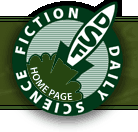"I know there's all this talk about my charisma deficit and I have to admit that I'm not a wild, in-your-face actor. It's not my nature to be flashy or extroverted, and that's why I see it a great challenge to me as an actor to be able to play against type and shake up people's perceptions of me." -- Tobey Maguire
Stupidity is not the same as personality. That is to say, even a stupid action has to fit within the character's personality. That's not always an easy thing to do, especially when we need a character to act in a way that the audience won't expect.
This is where the Enneagram can be very useful as a typing system for your characters.
As I was discussing last time, personality typing systems tend to be very static, meaning you are this or you are that, and there is no room for any variation. I'm going to bet, though, that we've all had one of those situations where you've run into someone you know in an environment you're not used to seeing that person in and had the thought, "Who was that guy? That's not the person I know." The Enneagram is the only typing system I've encountered that explains those variations beyond that it was just an "aberration."
The Enneagram divides personality into nine types and, as you can see from the diagram, the types are related to each other. So let's have a brief overview, shall we?
The types:
1. Perfectionist
2. Giver
3. Performer
4. Romantic
5. Observer
6. Loyalist or the Skeptic
7. Epicure
8. Boss
9. Mediator
[I do want to point out that depending upon your source, the names of the nine types may differ, especially since many of them have been given new names to give them a more positive spin. For instance, the 8 is sometimes, now, called "the Protector" and the 1 is called "the Reformer." The basic definitions of each type are still the same no matter what label they've attached. A rose is, after all, still a rose.]
These are the nine fundamental types, but it's a little more complex than just that, because each type has a wing that influences it. For instance, type 9 can have either an 8-wing or a 1-wing which will influence the 9s outlook on the world, but we'll get more into that later.
The types are also grouped into three centers that deal with how those types relate to the world. Types 2, 3, and 4 are the emotional center. Those types respond to events on an emotional level. Decisions are based on their emotional response without allowing time for thought or checking facts. Types 5, 6, and 7 are the intellectual center. They require data before responding or making a decision; however, they will often react on that data without regard to how it will affect other people. They ignore the emotional impact because the "facts" are on their side. 8, 9, and 1 are the instinctual center. They are somewhat of a blend of the other two centers. They want the facts but, in the end, they respond from their "gut" reaction. What "feels" right. [This is not to be confused with "feeling" as an emotion. The emotional group does not respond from what "feels right;" they respond from a specific emotion.]
Now, here's the thing that makes the Enneagram stand out for me:
You've probably noticed that the diagram has lines connecting some of the types. Those lines are important, not just a funky design. Remember how I said that the Enneagram explained how people can seem like aliens sometimes? The lines show which types are connected.
So let's take 9 as an example (it's right there at the top, after all):
Each type has a stress point and a security point. Typically, the 9 is going along in its Mediator kind of way (the 9 is also often known as the Peacekeeper) but, when its at its security point, the place where the 9 feels relaxed and comfortable, it slides into the role of the 3, the Performer. However, when the 9 is at its stress point (this does not necessarily mean "stressed out," though it can mean that; it just means in a place where the 9 is not comfortable), it becomes the Skeptic and feels like everyone is out to get it. Persecuted, so to speak.
So that's what the lines are for and, briefly, tell us how specific Personalities can act in ways we don't recognize. I'll get more into all of that as I discuss each of the types.
If you're curious as to your own type, there are tests available online. The "best" ones cost money (meaning, basically, the ones that take the most time to take), but there are various free ones available. Here's a link to one that is at least above average and probably the best free one I've seen. If you're an author, I'd say to go take it to give you some context into all of this personality stuff and see how you relate to it.









